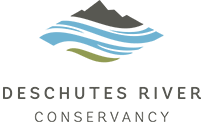CLICK TO LEARN MORE ABOUT OUR FOCUS AREAS: CROOKED RIVER UPPER DESCHUTES MIDDLE DESCHUTES MCKAY CREEK TUMALO CREEK WHYCHUS CREEK
Check River Flows Gages & Reservoir Levels









Lower Deschutes River
Location: Lake Billy Chinook to the Columbia River
Primary Habitat: Native rainbow trout, salmon, steelhead, lamprey
Challenge: Rising temperatures and toxic algae blooms degrade habitat
Middle Deschutes River
Location: Bend to Lake Billy Chinook
Primary Habitat: Rainbow trout, mountain whitefish, with steelhead and Chinook salmon below natural fish passage barriers
Challenge: Low flows in the summer create habitat and water quality issues for fish and wildlife.
Click here for restoration efforts.
Upper Deschutes River
Location: Wickiup Reservoir to Bend
Primary Habitat: Oregon Spotted Frog, brown trout, rainbow trout, brook trout, mountain whitefish
Challenge: High flows in the summer and low flows in the winter damage habitat and river structure.
Click here for restoration efforts.
Crooked River
Location: Flows through Prineville and is a tributary at of the Deschutes River with the confluence at Lake Billy Chinook.
Primary Habitat: Bull trout, steelhead trout, Chinook salmon and redband trout, brown trout, mountain whitefish
Challenge: Low flows in the summer create habitat and water quality issues for fish and wildlife.
Click here for restoration efforts.
Metolius River
Location: Tributary of the Deschutes River with the confluence at Lake Billy Chinook
Primary Habitat: Sockeye salmon and bull trout, mountain whitefish
Challenge: Retains a relatively intact and healthy eco-system.
Fall River
The Fall River is a tributary of the Deschutes River in the Deschutes National Forest in Deschutes County, Oregon, United States. The source is a spring approximately 2 miles northwest of Pringle Falls.
McKay Creek
Location: Tributary of the Crooked River
Primary Habitat: Steelhead spawning and rearing grounds
Challenge: Altered hydrograph as well as water and habitat quality affect fish and wildlife.
Click here for restoration efforts.
Mill Creek
Location: Tributary of the Crooked River
Primary Habitat: Redband trout
Challenge: Low flows in the summer create habitat and water quality issues for fish and wildlife.
Ochoco Creek
Location: Tributary of the Crooked River
Primary Habitat: Steelhead trout, Chinook salmon and redband trout
Challenge: Low flows in the summer create habitat and water quality issues for fish and wildlife.
Trout Creek
Trout Creek is a 51-mile long tributary of the Deschutes River. It drains approximately 692 square miles of Crook, Jefferson, and Wasco counties. Arising in the Ochoco Mountains, it flows north and then west to its confluence with the Deschutes River.
Tumalo Creek
Location: Tributary to the Deschutes River with the confluence on the Middle Deschutes
Primary Habitat: Redband trout
Challenge: Low flows in the summer create habitat and water quality issues for fish and wildlife.
Click here for restoration efforts.
Willow Creek
Willow Creek is a tributary, about 26 miles long, of the Deschutes River in central Oregon in the United States. Arising near Foley Butte in the western Ochoco Mountains in Crook County, it flows generally northwest into Jefferson County and through the Crooked River National Grassland.
Whychus Creek
Location: Tributary to the Deschutes River with the confluence on the Middle Deschutes
Primary Habitat: Chinook salmon, steelhead and redband trout, and bull trout
Challenge: Low flows in the summer create habitat and water quality issues for fish and wildlife.
Click here for restoration efforts.
THE DESCHUTES STORY: COLLABORATION OVER CONFLICT
HISTORY
Over 100 years ago, federal and state policies encouraged the settlement of the high desert by facilitating access to land and irrigation water. In many cases, the state gave out more water rights than existed in the river during the dry summer months. While this access to water has allowed our region to support an early agricultural economy, the philosophy of the time didn't include concern for ecological health of the region.
PROBLEM
European settlers constructed an impressive 700 miles of canals to convey water throughout the land to "make the desert bloom," but the fractured basalt they dug into is now known to leak up to fifty percent of the water passing through. Combined with inefficient watering practices, increased urbanization of previously designated farmlands, and increased competition for water supply, we are seeing the unintended consequences of these actions. Low and altered streamflow has led to a decline in healthy habitat and overall health in many basin streams. Sadly, a similar story is echoed throughout the arid Western United States and has been the source of much conflict.SOLUTION
Unlike other basins however, the Deschutes Basin has a long history of collaboration around water issues. Diverse partners and stakeholders have made significant progress restoring streamflows together in ways that support agriculture and communities. In a world of increasing water scarcity and a changing climate, we strive to model cooperation instead of conflict.There is an African proverb that states: "If you want to go fast, go alone. If you want to go far, go together."
For 25 years, we've chosen not to go alone. By bringing often conflicting stakeholders together to solve complex water issues, our work in the Deschutes basin has set a standard of long-term collaborative streamflow restoration. We believe that's the way we will make lasting change in the health of our rivers and streams and provide a healthy region for our children and grandchildren.



